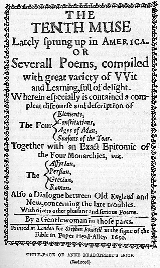him in the firmament
of his great mightiness.
O praise him for his acts
that be magnificent,
"& praise ye him according to
his greatness excellent.
With trumpet praise ye him
that gives a sound so high:
& do ye praise him with the Harp
& sounding Psalterye."
Psalm cl.
The student may be sure that he will find many worse compositions in this collection; it is doubtful if he will find smoother. And yet the Bay Psalm Book served its sacred purpose in the New England churches for more than a century; it was even used to some extent by Puritan worshipers in England and Scotland until after 1750. At the Old South Church in Boston, the Bay Psalm Book, although it had been revised, was not displaced until 1786.
Anne Bradstreet, 1613-72.
From the midst of the crude and sombre compositions of Puritan verse-makers, there arose one writer
for whom in some measure the poetical gift may be claimed. This was Anne Bradstreet. In 1650, the
first volume of her poems was published in London. Upon the title-page of this volume the author was
rather extravagantly introduced as "the Tenth Muse lately sprung up in America." Anne Bradstreet, a
really gifted woman, was the daughter of Thomas Dudley, a Puritan soldier and scholar, who has been
described as a "typical narrow-minded, straitlaced Calvinist, for whom it is so much easier to entertain
respect than affection."1 Nevertheless, Anne Dudley was reared in comfort and enjoyed especially the
dear delight of books. She was married at sixteen to Simon Bradstreet, a Puritan gentleman who afterward
became a leader in colonial affairs and a governor of Massachusetts. In 1630, the entire family joined
the company of emigrants to America, Thomas Dudley holding the position of deputy governor under
Winthrop. The Bradstreets settled near the present town of Andover, not far from the beautiful Merrimac.
For this young wife, accustomed to an atmosphere of comfort and refinement, the experiences of pioneer
life must have been trying in the extreme. Yet, in the wilderness, amid its threatening perils, superintending
the work which falls to the mistress of a farm, rearing and educating her eight children, Mrs. Bradstreet
found comfort in literary occupation, and both time and spirit to write. The quality of her mind is shown
in her prose, but it was as a poet that she found fame. In her verse, she is influenced by the work of
such of the English poets as would naturally have impressed her: the devotional poems of John Donne,
of Francis Quarles, author of the Divine Emblems; of the Puritan poet, George Wither, and the deeply
spiritual poetry of the saintly George Herbert. The verse of these minor English poets who flourished in
the time of James and Charles I -- the period of Anne Bradstreet's girlhood and early womanhood -- was
characterized by an unusual and fantastic style of thought and diction. These men are sometimes called
the "metaphysical poets," because of this artificial quality and on account of their grotesque conceits.
The crude rhymes of the colonial epitaphs already quoted, with their incongruous puns, are rather extreme
examples of this fantastic style. The work of the "Tenth Muse" shows the influence of this taste for a
strained and laborious ingenuity of expression. Her longer works are didactic; so filled with the eager
purpose to instruct and edify that the natural Puritan scruples regarding a woman's practice of the literary
art were in large degree forgotten. The Four Elements and The Four Seasons are in the form of dialogue,
wherein the speakers individually maintain their claims to preëminence; these poems are mechanical and
heavy compositions, but show a facility of phrase and rhythm quite new to the readers of colonial verse.
The Four Monarchies, her most ambitious poem, is a rhyming chronicle based upon Sir Walter Raleigh's
History of the World. When Anne Bradstreet's poems were published, in 1650, they were received with
extravagant praise in America; and following her death, not a few of her admirers essayed to express
their appreciation in flattering verse. 
John Rogers, who before his death became president of Harvard College, paid his tribute to the genius of Anne Bradstreet in quite exalted utterance. One stanza of his composition may be quoted, in testimony to the effect produced in contemporary minds of literary taste by this gifted woman's work.
"Twice have I drunk the nectar of your lines,
Which high sublimed my mean-born fantasy.
Flushed with these streams of your Maronian wines,
Above myself rapt to an ecstasy,
Methought I was upon Mount
| Previous chapter/page | Back | Home | Email this | Search | Discuss | Bookmark | Next chapter/page |
See our FAQ for more details.